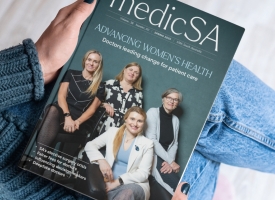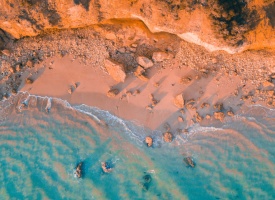Dr Chris Zappala - air quality
Transcript: AMA Vice President, Dr Chris Zappala, with Sami Shah, ABC Radio Melbourne, 10 January 2020
Subject: Air quality, haze from bushfires, and appropriate masks
SAMI SHAH: And we've been talking about P2 masks for the last few weeks now. It's a particular kind of mask that is more effective in filtering out some of the particles that can affect people during the smoke and haze areas. They say if you cannot stay indoors and have to go outdoors, then make sure that the mask you're wearing is either P2 or an N95. It's the same name for the same type- it's a different name, sorry, for the same kind of mask.
Dr Chris Zappala is the Vice President of the Australian Medical Association and he's a respiratory physician. Thank you for speaking to us, Chris. These masks, just how safe are they?
CHRIS ZAPPALA: Well, they offer a degree of protection, Sami. They filter out smaller particles than the standard paper type masks that you see some people wearing at other times. But of course, like all things, they have their potential limitations. But look, they're definitely better than nothing, and if you are able to get them and use them properly, then they will offer some protection, as you said in your introduction, if you must go outside and be exposed to the smoke and so on that's in the air.
SAMI SHAH: And given the fact that we've been hearing about them for some time now, it's issues like shortages that people are being concerned about. It's the fact that the masks are a short-term use; after a few hours you're supposed to get rid of them and use a new one, right?
CHRIS ZAPPALA: Yeah, that's exactly right. As they get moistened, so when they condensate with the vapour in our breath, as we continually breathe through them, the mask gets moistened, and that will reduce its effectiveness over time. As soon as you touch it and so on, obviously that will make a difference to how effective it is. And clearly, if you take it off and then, you know, it's exposed to the environment, and you go to put it back on again, that's not so good. You see some people with masks dangling around their necks and then they pop them back on, and I don't think that that's very helpful at all. So they definitely do have a lifespan of a few hours, and as soon as you take it off or handle it, you probably should change it if you can. And I appreciate that they're in short supply at the moment, but my understanding is that the processes, the systems that be, are trying to push them out as much as possible for people to use.
SAMI SHAH: So, given the fact that they are in short supply, maybe we should be more judicious in who we tell to use them. There's a mild haze over parts of Melbourne today, for example, should that be P2 mask implementation weather or should it be in more severe conditions?
CHRIS ZAPPALA: Look, it's a really good question, and I think that's right. If the levels of exposure are low and if your respiratory system is normal, then you should cope with that. So, the normal cleaning mechanisms should be able to deal with that. If you've got a known medical problem, particularly obviously a respiratory problem, if you've got multiple medical issues, if you're quite young or quite old, if you're pregnant and you're going out into more higher levels or sustained exposures, then absolutely please do use whatever protection you can, including the mask. So, I think people are going to just have to apply some common sense. But I agree with you - transient low-level exposure, I think people who are otherwise normal should feel comfortable. Generally speaking, their airway will cope with that and they won't need a mask. But if they're going to be out for long periods of time or in higher levels of exposure, then by all means.
SAMI SHAH: I'm speaking with Dr Chris Zappala. He's a respiratory physician as well as the Vice President of the Australian Medical Association. We're talking about P2 masks. They're also called N95 masks. They're face masks that can filter out fine particles to do with smoke and haze. They're the ones that have been recommended for people in fire-affected areas, as well as here in Melbourne where the haze settled - if you remember - fairly severely on Monday. We've had it quite light since then.
Chris, have you heard of any pharmacies, pharmacists, and such giving out the wrong masks by mistake? There have been a few text messages, not many, but a few of people buying them, getting home, and realising they didn't get the right one.
CHRIS ZAPPALA: Unfortunately, I think that's always going to be a bit of a risk, because there's a whole bunch of masks out there, and it’s programs like this that are useful so that people have some idea of which one to get. That's not to say that an alternative might not be mildly helpful, but definitely the one that we're talking about, the P2 or N95, is the one that seems to have the runs on the board that's going to give some help. And if we go to our Department of Health in each State's website, they've got information about these masks, how to put them on, how to seal them correctly, and also where hopefully to get them from.
So, that is the desirable one, and if people need to eyeball it and see exactly which one it is that they need before they go out and buy something, then they can pop online.
And I checked this morning, most of the Department of Health websites have got good information about these masks and how to identify them, and more importantly, how to wear them appropriately as well.
SAMI SHAH: Availability does remain a problem, though. We've got a text message here that says a lot of stores sold out of the P2; I got some at another store but they're selling them individually $3 to $4 each., they're not sold in lots of two, or three, or four for a similar price however. It's opportunism that seems to be a concern at times like this, with something that has become a valuable resource, something that in previous times we never even thought about.
CHRIS ZAPPALA: I guess we've just got to hope on people's good nature and understanding in these difficult circumstances. The Department of Health, Federally, has issued information that they are trying to push masks out through pharmacies, the P2 mask, as much as possible.
So, I think unfortunately there will be a difficulty with supply just because the demand is obviously unexpectedly so high just at the moment, but there are attempts to try to get the mask through pharmacies and other means out to people. But these are the same masks that you might actually also be able to get from your local hardware store, so they don't have to be at the at the pharmacy, because people in industrial settings do use these masks occasionally as well, so there's a couple of options there to look for supply. And as I said, pop on to your Department of Health website, they might be able to help as well with way to get them from.
SAMI SHAH: We're talking with Dr Chris Zappala, Vice President of the American Medical Association about the availability of the P2 mask. Let's say you can't get it. Let's say there's just no masks available where you are, or you run out, you are not able to go out and get a resupply, and another one of those haze settles over Melbourne. What's the other option?
CHRIS ZAPPALA: Well, there's not really a great option in terms of other masks. I think you just have to find a way to stay out of that smoky haze or remove yourself from it physically. And if that means that you leave town for a period or obviously if you stay indoors where there's more filtered air, if you're in an air-conditioned type environment, that's honestly as much as you can do. I don't think there's much point in us trying to slice and dice the different variants of the other masks out there, which would be minimally helpful. We just have to accept that the situation is difficult, and you know, no one really could have prepared entirely for this, and do our best in terms of reducing exposure and risk.
SAMI SHAH: All right. Well thank you so much for speaking with us there, Dr Chris Zappala, a respiratory physician and Vice President of the Australian Medical Association. One of the key bits of advice there being unless the haze is severe here in Melbourne, you don't actually need the masks, so be judicious in when you do buy them, because supplies are tight.
12 January 2020
CONTACT: John Flannery 02 6270 5477 / 0419 494 761
Follow the AMA Media on Twitter: http://twitter.com/ama_media
Follow the AMA President on Twitter: http://twitter.com/amapresident
Follow Australian Medicine on Twitter: https://twitter.com/amaausmed
Like the AMA on Facebook https://www.facebook.com/AustralianMedicalAssociation



